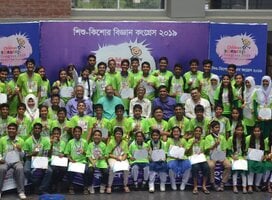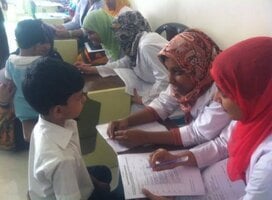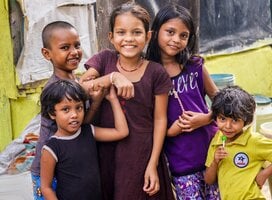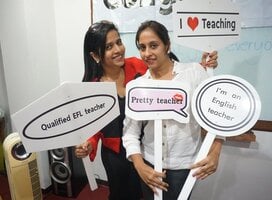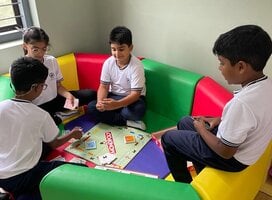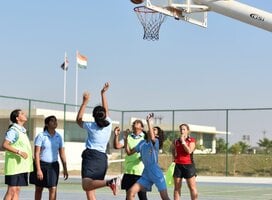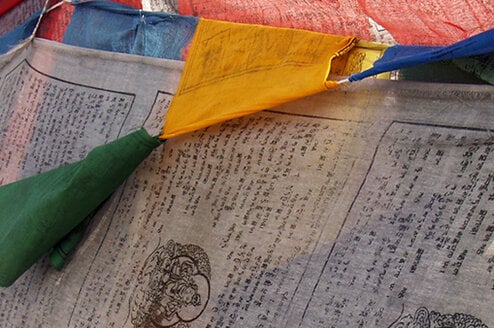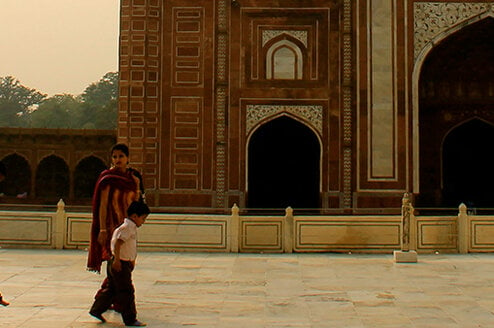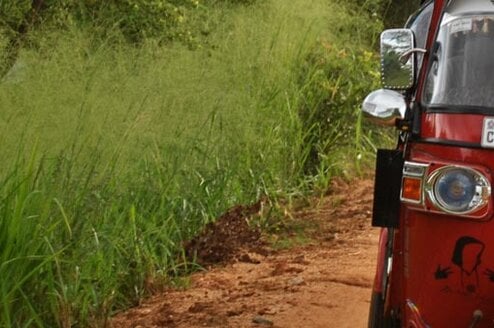Teach English in Bangladesh
Bangladesh is not a hot spot for native English-speakers to teach ESL classes, unlike what you may find in East Asia or the Middle East, since most of the local English teachers in Bangladesh are already fluent English speakers. Though, don’t let this deter you from looking into Bangladesh as a great place to live and work. There are teaching opportunities in Bangladesh, and it is a country that accepts foreign teachers with open arms.
The path to finding a teaching job in Bangladesh may not be as obvious as it is for some countries, but if you do land a job in Bangladesh, you will be rewarded with an experience that by no means will ever be considered average, boring, or predictable. Keep this in mind as you go about your job search: boiling down a teaching job in Bangladesh to an average is next to impossible. Bangladesh is a place that doesn’t easily accept norms, but if you’re up for adventure in a country with some of the most hospitable people you can imagine, Bangladesh will not disappoint.
At Go Overseas, we strive to provide the most comprehensive program and job listings available. At this time, we are only able to find a few teaching opportunities in Bangladesh, listed below. You can read this full guide to teaching in Bangladesh, use the Search page to explore other teaching opportunities, or browse the Teaching Job Board for opportunities around the world.
Most foreigners involved in education in Bangladesh work at international schools, and the word on the street is that to make money teaching in Bangladesh, international schools are “where it’s at”. Outside of the international school scene, there is a smattering of other opportunities in the education sector, most of which are scholarship or volunteer-based.
International Schools:
Requirements for international schools vary, but at a minimum, a bachelor’s degree is required; a teaching certificate is sometimes required as is experience. You will have to individually thumb through the schools to find out their requirements and current job listings. A quick online search of ‘international schools in Dhaka/Chittagong’ is a good place to start. Some schools follow a schedule similar to the North American School schedule; others do not. The International School Dhaka is an example.
Private Language Academies/Schools:
Private language schools are not as abundant in Bangladesh as in neighboring Asian or Middle Eastern countries. The British Council employs teachers at its Dhaka center. Recruitment for full-time positions takes place in London. Recruitment for part-time positions takes place in Dhaka. However, part-time hours fluctuate depending on student enrollment.
Universities:
Some universities in Bangladesh might hire the occasional foreigner. However, getting a visa might not be so easy. Private universities would be a much better bet for finding a position than public universities. For a list of private universities in Bangladesh, see EduIcon. Then, you will have to go to each university’s website to check for job openings — admittedly, a laborious process.
Volunteering:
There are a number of volunteer teaching programs and opportunities in Bangladesh. Most volunteers do not need to have formal training, or prior experience, though it does help. In addition, some volunteer programs in Bangladesh have longer commitments, allowing teachers to fully form a relationship with their classes and students.
For example, WorldTeach has a year-long volunteer program at Asian University for Women (AUW) in Chittagong. Volunteers are assigned roles as teaching assistants in undergraduate programs, writing center tutors, writing seminar leaders, lab assistants, and English teachers or a combination thereof. Additionally, IUBAT is a non-profit, non-government English-medium university in Dhaka and accepts volunteer lecturers in a number of subject areas including English, economics, philosophy, tourism, and software engineering. Teaching experience, especially at the university level, is a definite plus. IUBAT does not charge any volunteer fees, and room and board are provided. IUBAT does not state a minimum length of time for volunteering, but volunteers need to be able to commit to at least a semester.
Fellowship Programs:
Fellowship programs, such as the Fulbright English Teaching Assistant program and the English Language Fellowship program, place teachers in schools and universities in Bangladesh. Fulbright placements are typically in the major cities of Dhaka and Chittagong. Bangladeshi Fulbright ETAs have two months of language training beginning in early November and then work in a classroom alongside a Bangladeshi teacher from January to September. ETAs receive a stipend to cover living expenses.
The English Language Fellowship program places experienced English teachers with an MA in TESOL or related field in regions around the world for 10-month fellowships. English Language Fellows provide teacher training and classroom teaching and are involved in various programs that support the improvement of English learning and teaching. Bangladesh typically hosts one or two English Language Fellows each year.
Private Lessons:
If you are already working in Bangladesh, you could be asked to give private lessons in addition to your regular work schedule, but don’t go to Bangladesh with the idea that there is a large market for foreigners to teach private lessons. Most out-of-class tutoring sessions are given by local university students.
When and Where to Look for Jobs:
Most foreign teachers in Bangladesh work in the capital of Dhaka or the second-largest city and main seaport of Bangladesh, Chittagong. Both major cities are densely-populated and in the literature are often called ‘bustling.’ Certainly, rural areas are in need of teachers and are often eager to learn about outsiders and different ways of doing things, but the majority of opportunities are still concentrated in the major cities.
You can find information about international schools and scholarships, fellowships, and volunteer jobs online as listed above. Once you are in country, however, you might learn about teaching opportunities that are not posted online.
Qualifications:
Requirements vary for many of the volunteer positions, and often there is no minimum requirement. For positions such as the Fulbright position or the WorldTeach volunteer position, you need a bachelor’s degree. For the English Language Fellowship program, a master’s degree is required. A CELTA or TEFL certificate is generally not listed a requirement for teaching positions in Bangladesh, but if you are new to teaching, it would be a good idea to have one under your belt for your own sense of confidence.
Salary & Cost of Living:
As there is nothing that is really average in Bangladesh, there also isn’t really a median salary, but accounting for volunteer jobs and international school jobs and everything in between, the average salary will come in at around $2,000 USD per month. Rates for private lessons (uncommon) are subject to your negotiation abilities.
Generally, airfare is not a part of the package for most teaching jobs in Bangladesh, but is included for some of the volunteer, scholarship, and fellowship positions. Some teaching jobs in Bangladesh will include housing, but many will not. Rentals can be found either online, or, as crazy as it sounds, by walking around the neighborhood you would like to live in, seeking out house-rental ads, and making calls.
The cost of living in Bangladesh is generally low, especially if you maintain a certain level of frugality. A bottle of water costs about 20 taka (15 cents USD), a Coke is 30 taka (38 cents USD), and a meal of Bengali food runs about 300 – 500 taka ($3.80 – $6.32 USD). Housing prices vary drastically depending on whether you’re in a city center or on the outside. You could find a nice 3-bedroom apartment in Dhaka for about 24,000 taka (about $300 USD) per month. One-bedroom or studio apartments are hard to come by, but you can nearly always find a flat-share. Life in Bangladesh can be a bit costly if you indulge full-out in all the luxuries such a full-time driver, imported foods, and expensive meals out.
Classroom & Work Culture:
- Student/Teacher Relations: Bangladeshi students, although they might be late for class and might occasionally forget to do some of their assignments, are, perhaps, the politest and most respectful students you could hope to teach, and the majority of them maintain a sincere and eager interest in learning. Besides that, they have a delightful sense of humor. Though, as with any group of students, you will have to maintain classroom control, you probably will never have to pull out your Clint Eastwood, tough-guy teaching persona. In fact, your biggest classroom management problem at times might be trying to quell enthusiasm. Bangladesh students are also incredibly receptive to foreign instructors; they are open to new methods of instruction, and they enjoy interacting with outsiders and learning about other peoples and places and sharing their culture with you.
- Dress Code: For foreign men in Bangladesh, dress is fairly simple and straightforward, and you should not need a new wardrobe if you go to Bangladesh to teach. Local men typically wear slacks and a nice shirt for teaching and suits for more specialized events such as conferences and workshops. In universities, local women most often wear the salwar kameez (an outfit set of loose pants with a tunic top and scarf) and sometimes saris. In primary and high schools, local women often wear saris and sometimes salwar kameezes. As a foreign female, you can sport your business casual wear and suits to teach in Bangladesh, but you will probably be more comfortable in the local clothing as it is well-suited for the hot climate as well as the culture. The important thing to remember for both men and women is to be covered. Women should avoid tight and overly-fitted clothing. What you would consider as modest in the Western world might get unwanted attention in Bangladesh. The easiest way to deal with wardrobe concerns is if you are female is to wear local outfits—luckily, they are affordable and often very attractive.
- Greetings: Men always shake hands, always with the right hand and with a decent grasp. Men who have already met a few times sometimes may greet one another with a light touch on the shoulders with the left hand. Bangladeshi women typically do not shake hands, but if a woman does extend her hand, you should respond in kind. In some parts of Bangladesh, children greet their elders by touching their feet—this shows respect.
